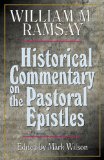Historical Commentary on the Pastoral Epistles By William M. Ramsay. Ed. by Mark Wilson. Grand Rapids: Kregel Publications, 1996. 160 pp. Paper, $9.99.
Many religious writers have doubted or denied the historical reliability of at least parts of the Bible. Few, however, have gone out to test these theories as did Sir William Ramsay (1851-1939). His good results are known to many, but not to enough, as F. F. Bruce pointed out. Sir William studied at Aberdeen and Oxford and was the first professor of classical art and archaeology at Oxford. He traveled in Paul’s footsteps and found in his archeological research that Luke was very accurate in his use of local terms in the book of Acts. In a sense, this helpful book is a reprint, though it was not originally a book, but 31 essays from 1909-1911 in The Expositor, Seventh Series. By careful editing Wilson has produced a modern, readable, and conservative volume. Ramsay was politically incorrect: He believed Paul wrote these letters.
His view on church leaders is that they were special, but not a separate class in the clergy/laity bifurcation that began to evolve in the late first or early second centuries, especially in Asia (Province). He believed elders held office for life, barring a very major failing. Also, he held that each presbyter must have all the qualifications that Paul lists in 1 Timothy 3 and Titus 1.
Some of the interesting topics that Sir William covers are: False Teachers, the Idea of Motherhood in the Letters of Paul, Deaconesses, Slaves, the Family as the Basis of the Organized Church, and the Pauline Philosophy of History as Expressed in the Pastoral Epistles.
Those who appreciated Ramsay’s classics, St. Paul the Traveller and Roman Citizen, Historical Commentary on Galatians, and The Letters to the Seven Churches, will want this book.
Arthur L. Farstad
Editor
Journal of the Grace Evangelical Society
Dallas, TX


